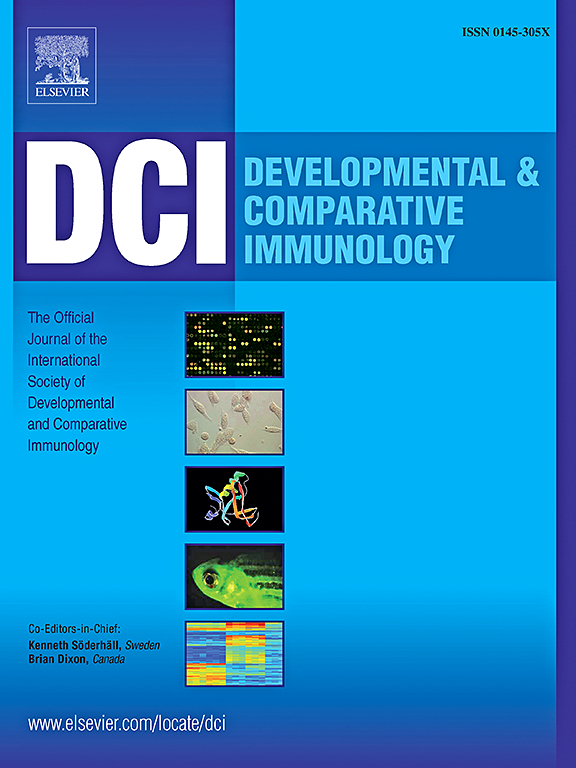A recombinant sPLA2 protein promotes gut mucosal barrier against bacterial infection in fish
IF 2.7
3区 农林科学
Q1 FISHERIES
引用次数: 0
Abstract
Secreted phospholipase A2 family protein (sPLA2) is associated with immune response and plays a critical role in the regulation of gut homeostasis. However, whether sPLA2 is involved in innate immunity in teleost is essentially unknown. For this purpose, we reported the identification of a classical sPLA2 in grass carp (CisPLA2) and elucidated its role in the antibacterial immunity in this study. The result of bioinformatics analysis showed that mammalian sPLA2-IIA is the most similar homologue to CisPLA2. CisPLA2 is expressed in a variety of tissues, including liver and gut, and is significantly upregulated in response to Aeromonas hydrophila infection. Recombinant CisPLA2 protein (rCisPLA2) showed significant antibacterial activity against A. hydrophila by enhancing the phagocytosis of host phagocytes in vitro. Moreover, rCisPLA2 induces significant expression of the antimicrobial molecules and tight junctions in the gut during bacterial infection. Fish administered with rCisPLA2 significantly alleviates the gut permeability and apoptosis. In addition, rCisPLA2 preserves the morphology of the gut mucosa and limits the colonization of A. hydrophila in systemic immune organs. These results indicate that CisPLA2 plays a crucial role in the regulation of gut mucosal barrier, and thus has a potential application for antimicrobial immunity in fish.
重组 sPLA2 蛋白可增强鱼类肠道粘膜屏障,防止细菌感染。
分泌型磷脂酶 A2 家族蛋白(sPLA2)与免疫反应有关,在调节肠道平衡中发挥着关键作用。然而,sPLA2 是否参与了远洋鱼类的先天性免疫基本上还是未知数。为此,我们鉴定了草鱼中的经典 sPLA2(CisPLA2),并阐明了它在抗菌免疫中的作用。生物信息学分析结果表明,哺乳动物的 sPLA2-IIA 是与 CisPLA2 最相似的同源物。CisPLA2 在肝脏和肠道等多种组织中表达,并在嗜水气单胞菌感染时显著上调。重组 CisPLA2 蛋白(rCisPLA2)通过增强宿主吞噬细胞的体外吞噬能力,对嗜水气单胞菌显示出显著的抗菌活性。此外,rCisPLA2 还能在细菌感染期间诱导肠道中抗菌分子和紧密连接的大量表达。给鱼注射 rCisPLA2 能明显缓解肠道渗透性和细胞凋亡。此外,rCisPLA2 还能保护肠道粘膜的形态,并限制嗜水蚤在全身免疫器官中的定植。这些结果表明,CisPLA2 在调节肠道粘膜屏障中起着关键作用,因此有可能应用于鱼类的抗菌免疫。
本文章由计算机程序翻译,如有差异,请以英文原文为准。
求助全文
约1分钟内获得全文
求助全文
来源期刊
CiteScore
6.20
自引率
6.90%
发文量
206
审稿时长
49 days
期刊介绍:
Developmental and Comparative Immunology (DCI) is an international journal that publishes articles describing original research in all areas of immunology, including comparative aspects of immunity and the evolution and development of the immune system. Manuscripts describing studies of immune systems in both vertebrates and invertebrates are welcome. All levels of immunological investigations are appropriate: organismal, cellular, biochemical and molecular genetics, extending to such fields as aging of the immune system, interaction between the immune and neuroendocrine system and intestinal immunity.

 求助内容:
求助内容: 应助结果提醒方式:
应助结果提醒方式:


